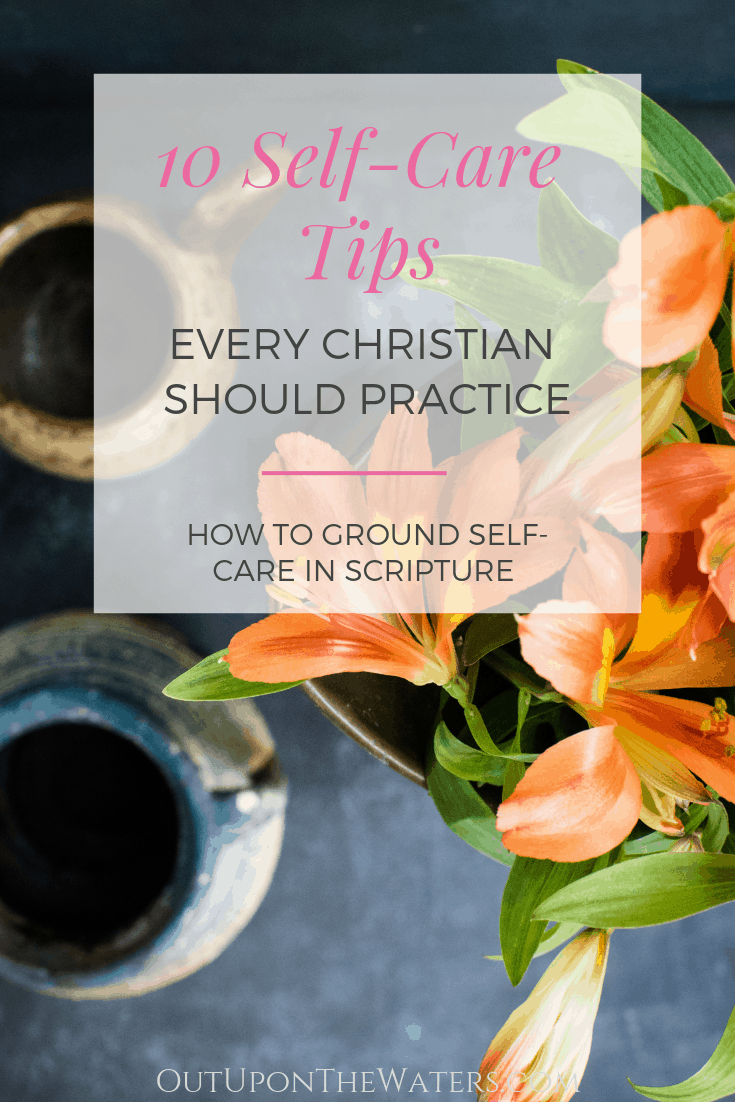Self-care is a trendy topic, especially in our society driven by accomplishment and busy-ness. How do we slow down and make sure that we don't burn out from all the doing? How do we make sure that we take some time to recharge without feeling guilty that we're not accomplishing? Without feeling that we're wasting our time being lazy or self-indulgent?
These self-care tips are meant to help you not only slow down and recharge, but also to help you reconnect with God in every season of your life, especially those that seem arid or overwhelming.
Disclaimer: This post may contain affiliate links. By purchasing a product using my links, I earn a small commission at no extra cost to you. I only promote products that I find worthwhile and that I think will add value to your life. See our full affiliate disclaimer here.
Should Christians Practice Self-Care?
At first glance, the practice of self-care might seem rather...well, selfish, self-centered.
We're told that "you need to take care of you", and that "you can't fill from an empty cup". (That second one is 100% true.)
The practice of self-care might also call to might slogans like "you deserve this", "give yourself a treat".
All this focus on the self. Is that really Christian?
Well, as it turns out, there is a really good Biblical basis for practicing self-care. But Christian self-care isn't the same as you find in the rest of the world: manicures and spa days and expensive jewelry and fancy chocolate. It's more like soul-care than like buy-fancy-stuff-and-leave-me-alone-care.

10 Self-Care Tips Every Christian Should Practice
Here are 10 important principles that we find in the Bible that every Christian should put into practice. This is, at least in part, what self-care should look like for a Christian.
This is what helps you to fill your cup so that you can pour into the cups of others. This is what helps prevent burnout and what helps keep you connected to God, to the source of all life.
1. Rest
John 15 is perhaps my favourite self-care verse in the whole Bible.
John 15 is where Jesus describes himself as the vine and us as the branches.
John 15: 4 says "Abide in me, and I in you. As the branch cannot bear fruit by itself, unless it abides in the vine, neither can you, unless you abide in me."
We can take from this passage a few different things. First, we cannot bear fruit if we are cut off from Jesus. He is the source of life.
And second: note the word abide (in the English Standard Version). To abide is to rest. We need to rest in Jesus.
This is almost counter-intuitive in our culture today. We value busy-ness and accomplishment. We are constantly doing.
In fact, I remember, in a particularly challenging season in my life, loudly proclaiming to my husband: "I am not a human being. I am a human doing." That was a cry for help.
We often find our self-worth in the things that we do, in the books or the essays that we write, in the children that we raise, in the awards that we earn, in the places where we volunteer. If we're not doing something, than who are we, even?
The answer: a beloved child of God. Regardless of what we achieve.
And we need rest amidst all this doing.
John 15 uses the images of the vine. In nature, there are natural periods of fruitfulness and rest. The grapevine doesn't produce fruit endlessly.

Growing Grapes in the First Century
Mike Breen, in Building a Discipling Culture, calls our attention to the first-century process of growing grapes.
"At the time of Jesus' incarnation, a vine would be cultivated, planted, and left to grow for three years before being allowed to bear fruit."
Did you catch that? Three years.
"Every time it tried to bring forth a bunch of grapes, it would be cut back. After the third year, the grapes would be allowed to grow on their own. By then the branches were strong enough to support the weight of the grapes without breaking. After the harvest, the branches were pruned back for a time of nourishment and rest before the fruit-growing season began again."
This is the image that would come immediately to mind to Jesus' audience. Like the grapevine, if they wanted to be fruitful, they needed to rest. And to rest for more than just five minutes.
It may take time to learn how to rest, and to rest without feeling guilty. I know it did for me. It took a long time!
But you can be confident that, as you are learning to rest, God is working in you to make you more productive and more fruitful - and even, in time, more joyful. (Remember that one of the fruits that we bear is that of joy.)
2. Be Okay with Failure
This is another principle that comes out of John 15, and one that I think is so important for Christian self-care.
Be kind to yourself. Be okay with failure.
John 15:1-2 says “I am the true grapevine, and my Father is the gardener. He cuts off every branch of mine that doesn’t produce fruit, and he prunes the branches that do bear fruit so they will produce even more. "
There will be times in your life when you will be pruned. Branches that are not producing fruit will be cut off.
This might be scary and even painful. It might feel like failure. It might feel like loss. But it is actually part of God's plan to make you more beautiful and more fruitful.
Pruning helps shape us into the people we are meant to be.
Another Lesson from the Grapevine
Remember the first century grape growers? They would prune the grapevines for the first 3 years.
Every time the vine tried to produce fruit, its fruit would be cut off.
How many times in our lives do we face apparent defeat and failure? How many times do we cry out in defeat? How many times are we tempted to quit? How often are we discouraged and downcast?
Imagine if we were these poor grapevines in their pruning season: Every single time we try to produce fruit, it's cut off.
Every. Single. Time.
Can't I just get one thing right?! (Thinks the discouraged grapevine to itself.) Why, God, why?!
But the "why" is for greater fruitfulness. To make the branches strong.
If the grapes were allowed to grow on their own, without pruning, the branches would break. They couldn't bear the load.
And so with us too. In times of pruning, we are being strengthened for greater fruitfulness down the road.
Without pruning (and without rest), we will snap under the burden.

3. Withdraw
It's okay to need alone time.
Luke 5:16 tells us that "Jesus often withdrew to lonely places and prayed."
This is true for us as well. Amidst all of the demands of life, all of the appointments to keep, the dinners to cook, the children to raise, the reports to complete, the paychecks to earn, the friends to comfort or celebrate with, we sometimes need to withdraw.
This might be a weekend away by yourself. (Rent a hotel room, or stay at a monastery or a conference center. Set up a tent at a campground.)
This might be half an hour on a weekend where you retreat to a comfy chair with a book and lock the door behind you. (This is my chosen strategy.)
Your family and your friends will last for that long without you. And if you make it a habit, they will begin to understand and to embrace it. (My 5 year old twins give me half an hour to myself on Saturday morning because I make it non-optional. And besides, Dad is a perfectly capable parent too. ♥)
4. Sit at Jesus' Feet
The story of Mary and Martha is one of my favourites. Jesus and his disciples come to Martha's home where she lives with her sister Mary (and her brother Lazarus). While Jesus is teaching in the living room, Mary slips in and sits at his feet, listening intently. When Martha discovers this, she protests that she is working hard in the kitchen to get everything ready while Martha has left her to do all the work herself.
Jesus' response? "Martha...you are worried and upset about many things, but few are needed - or indeed only one. Mary has chosen what is better" (Luke 10:42).
Mary has chosen the better path.
If there's one thing that we learn from this story, it's this: Get out of the kitchen and into the living room. Take some time to sit at Jesus' feet.
Psychology Today sums this principle up really well. "Self care means knowing who you are and your limits. Self care means recognizing when you are doing more than you are used to handling and trying to figure out what can be done to slow down."

5. Study
Self-care isn't all pampering and rest, I'm afraid. As Christians, we are also called to study.
In Matthew 22:37, Jesus commands us to "[l]ove the Lord your God with all your heart and with all your soul and with all your mind."
What does it mean to love God with all your mind?
It means that we are to think about our faith and to study the Scriptures.
If we want to hear God's voice in our lives, then we better know our Bible. Scripture is one way that God speaks to us, even today. And the more you know your Bible, the more you will have the words of God and the stories of others at your fingertips to help guide you through your own life.
An Old Testament Example of Why and How Study Helps
Nehemiah is a part of a two-part series in the Old Testament (the first part being the book of Ezra) that tells of the continuing efforts of the Jewish people who returned to their homeland after 70 years of captivity in the Babylonian Empire.
Nehemiah himself is a Jewish leader who is able to rebuild the wall around Jerusalem, despite criticism and military attacks. Nehemiah does this brilliantly and with confidence.
He approaches King Artaxerxes and requests the required provisions with full confidence that he will succeed.
He answers his critics, saying "The God of heaven will give us success" (2:20).
He fends off military attacks from all around him while constantly praying to God (4:9).
Nehemiah's success comes from his confidence that God will see him through. And his confidence comes from the fact that he knows the Scriptures and he knows the promises of God.
In chapter 1, Nehemiah prays to God, saying "Remember the instruction you gave your servant Moses, saying 'If you are unfaithful, I will scatter you among the nations, but if you return to me and obey my commands, then even if your exiled people are at the furthest horizon, I will gather them from there and bring them to the place I have chosen" (1:8-9).
Nehemiah calls God on his promises.
There is no doubt, no uncertainty. No "maybe this is what God wants me to do."
Because Nehemiah knows what God has already promised.
When we study the Bible, we too can internalize the promises of God and use them to navigate our lives. We can be certain of what God wants and we, too, can call him to come through on his promises.
6. Pray
Prayer is not just a thanking God and a bringing our requests to God. Prayer helps us to align our wills with God's will. Prayer can be a practice of self-care.
Jesus consistently withdraws from the crowd and prays. He is constantly in contact with his Father, and this allows him to move forward confidently and in line with God's will.
It is significant, I think, that in the garden of Gethsemane, Jesus prays: "Father, if you are willing, take this cup from me; yet not my will, but yours be done." (Luke 22:42).
Jesus is willing to accept his Father's will even if it is contrary to his own. He knows that the Father's will is for the best, and that he has his best interests in mind (even if it may not seem so at the time).
When Prayer Leads to Success (and Failure)
We can also note that there are numerous places in the Bible where prayer makes a difference.
We looked at Nehemiah as an example of study. But he is also an example of prayer.
Nehemiah is constantly praying to God before making decisions. He does not try to figure things out on his own, without God, but consistently checks to see if his will is in line with God's will.
And he is successful.
Jephthath, however, is an example of just the opposite.
In Judges, we read of Jephthath's successful defeat of his enemies. Before the battle, however, he makes a vow to God, saying that, if God gives him success in battle, that he will sacrifice the first thing that comes out of his house upon his return.
Jephthath wins the battle. Upon his return, it is his only daughter who comes out to meet him. And Jephthath sacrifices her, as he promised.
(Horrific, I know!)
But there is something significant here: While Jephthath promised God that he would do this, he never checked in with God to see if this was God's own will.
Jephthath doesn't pray. He just makes a deal that he thinks is a good one. He never asks God about it.
(We can also note that nowhere in the story do we get the impression that God wanted Jephthath to keep his vow. Jephthath never prayed about that either. He simply went ahead with his own plans, without God's guidance.)
The moral of this story: prayer keeps us connected to God's will. And when it's God's will, it can't fail. (When it's our will, however, it can fail disastrously.)

7. Sleep.
Make sure you get enough sleep.
Jesus slept even in the middle of a furious storm at sea. You can make time to get enough sleep in your life.
This handy little article from Psychology Today outlines why we need to get enough sleep, and how much each person needs, on average.
8. Exercise.
1 Corinthians 16:19 tells us that our bodies are temples of the Holy Spirit. And we know that exercise helps to boost mood and helps you to live a longer, healthier life. Take care of your temple.
If you are strapped for time, you can even combine exercise with study, withdrawal, and prayer by listening to a sermon or a Bible passage on your phone while hiking through the forest.
(The One Year Bible Podcast has 10-20 minute audio clips each day that will help you get through the Bible in one year and start to internalize some of God's promises.)

9. Have girls' nights (or boys' nights). Have dinner parties.
Enjoy the company of your friends and family.
Mark 12:31 tells us to love our neighbours as ourselves.
Part of loving our neighbours is spending time with them.
This doesn't just mean volunteering at the food bank. It means eating together with the people around you. It means taking time to spend with people who enjoy your company.
10. Love yourself.
After all, we can't love our neighbours as ourselves if we don't really love ourselves. You are a beautiful and beloved child of God. Live that truth.
And while you are taking time to rest, study, and pray, maybe watch this insightful video from Henri Nouwen on living this truth.
